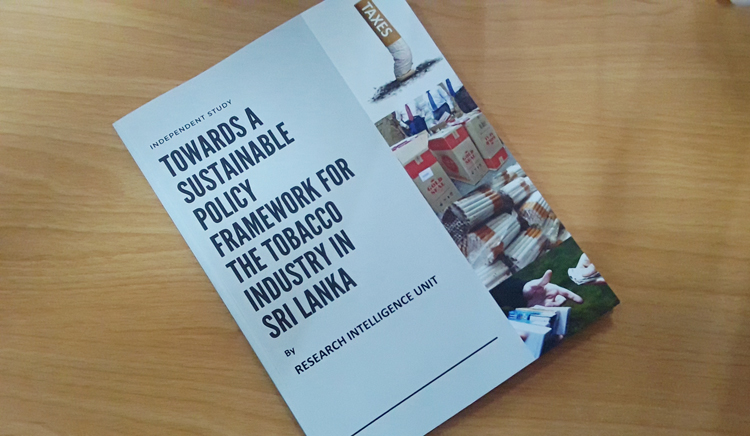March, 21, 2018

The Research Intelligence Unit (RIU) in collaboration with the Big Issue Magazine launched the Sri Lanka Economic Forum today. The theme for the forum was Taxation in Sri Lanka, with a focus on a case study of the tobacco industry. The report was part of an independent study conducted by RIU.
A country’s fiscal and taxation policy is a major determinant of macro-economic policy and sustainable economic growth particularly in areas such as government revenue, public debt as well as resource allocation and economic stability. The critical thrust of any Government policy on tobacco should be a focus on achieving two important objectives. Firstly, it is to reduce the negative health impact of tobacco consumption on the population. Secondly, it is to secure Government taxation revenues where this industry is typically one of the largest contributors. An absence of a national policy to balance these two objectives can result in deterioration in both the people’s health as well as the health of the national treasury.
“With Sri Lanka currently having the highest cigarette prices in the Asia Pacific region (PPP) and the second highest prices in the world, the island is also rapidly turning into a smugglers’ paradise” stated Mr. Roshan Madawela, Founder and CEO of Research Intelligence Unit.
According to Sri Lanka Customs, only one out of 10 smuggled cigarettes are discovered and confiscated by law enforcement agencies. Even in cases where large quantities of smuggled cigarettes are confiscated and the perpetrators apprehended, the fines imposed are not substantial enough to act as an obstacle for the criminal elements involved. With this rise in illegal cross border activity, RIU has also observed a recent upward trend with regards to the illegal smuggling of more dangerous substances such as hard drugs. This connection is also the subject of the ongoing Research Intelligence Unit (RIU) research into this industry.
During the research one-on-one meetings with relevant government authorities, institution leaders, taxation experts and industry stakeholders were held. In addition, a consumer survey with a sample of 120 consumers (smokers) who use cigarettes and/or Beedi, as well as retailers who sell these products were conducted.
Over recent years, Sri Lanka has introduced erratic and seemingly impulsive increases in the rate of taxation on cigarettes which has partly been the cause of the current market distortions that have triggered an enormous growth of smuggled cigarettes. Moreover, we can note that consistent tax hikes from 2009 to 2015 and the unprecedented tax hike in 2016 have since given way to large growth in the smuggled cigarette industry, thereby hampering the objectives of both the Ministry of Health and the Ministry of Finance.
The international agencies, including the World Bank, have suggested that a 10 percent rise in taxes will result in an 8 percent fall in smoking in low and middle-income countries. However, in Sri Lanka’s case, we can note that the availability of much cheaper alternatives in the form of Beedi, along with a growing choice of smuggled cigarettes that are priced competitively lower in the market, serve to illustrate that a ‘cut and paste’ approach to tobacco policy across international markets cannot work. In essence, taxation driven price hikes alone have proved that they are insufficient policy measures for delivering the reductions in smoking prevalence that has been quoted by international agencies.
According to the findings of this research several important observations and recommendations can be made as follows;
1. Form a multi-party advisory group that represents all the key players in this sector including the government and the private sector
2. De-politicize the issue of tobacco taxation and base it on a rationalized, balanced and well researched policy framework
3. Look at policy approach of Germany, Pakistan and others who have achieved their goals by monitoring and responding to their local environment and dynamics rather than blindly accepting policy dictates from international agencies
4. Consider the more important policy measures that are aligned with education and health awareness rather than only look at taxation to achieve health goals
5. Review policies on related industries like Beedi
6. Review the policy towards smuggling
“De-politicizing the issue of tobacco taxes is critical to ensuring that the legal and regulated industry has a predictable and level-playing-field that generates the forecasted amounts of revenue for the Treasury. Whilst the Government will want to balance the Health Ministry perspective with that of the Finance Ministry, it is essential that all stakeholders are included in the discussion” stated Mr. Madawela.
Video Story